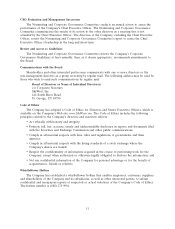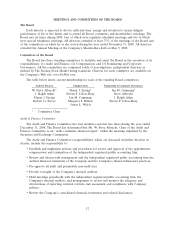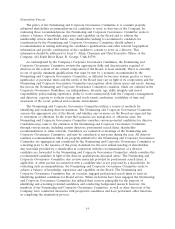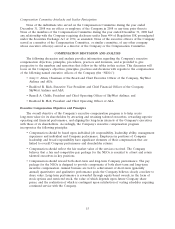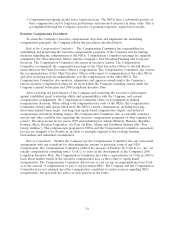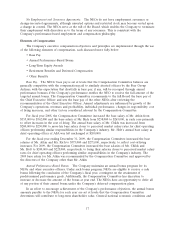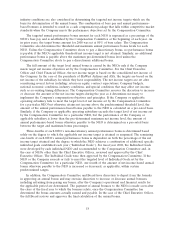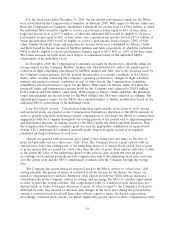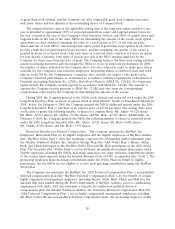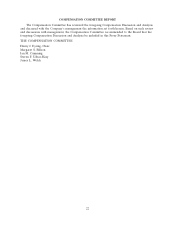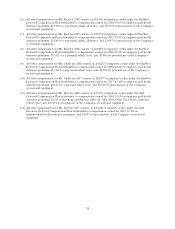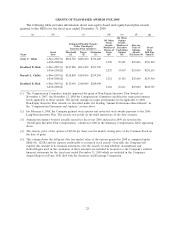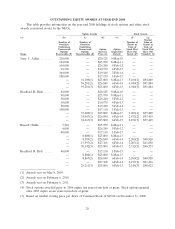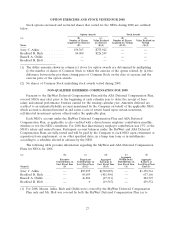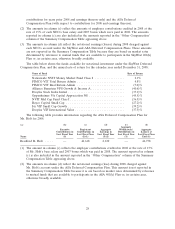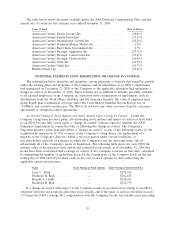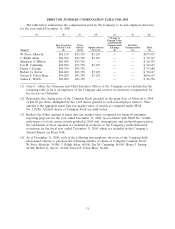SkyWest Airlines 2008 Annual Report Download - page 121
Download and view the complete annual report
Please find page 121 of the 2008 SkyWest Airlines annual report below. You can navigate through the pages in the report by either clicking on the pages listed below, or by using the keyword search tool below to find specific information within the annual report.each eligible employee’s account under the plan with a discretionary employer contribution. For 2008,
the discretionary employer contribution was 15% of the each eligible employee’s salary and 15% of the
annual bonus earned in the previous year that was paid in 2008. The SkyWest Deferred Compensation
Plan (but not the ASA Deferred Compensation Plan) also permits eligible executives, including the
NEOs, to elect in advance of each calendar year to defer up to 100% of their cash salary and bonus
compensation for the year.
The Company and its subsidiaries do not maintain any defined benefit pension plans for the
NEOs.
Other Benefits. In additional to the benefits described above, the Company provides other benefits
to the NEOs in order to achieve a competitive pay package. The Compensation Committee believes
that those benefits, which are detailed in the Summary Compensation Table under the heading ‘‘All
Other Compensation’’ below, are reasonable, competitive and consistent with the Company’s overall
executive compensation program. Those benefits consist principally of employer contributions to the
SkyWest and ASA Deferred Compensation Plans on behalf of NEOs, employer-paid premiums on
health insurance, personal automobile allowances, country club dues, and use of employer-owned
recreational equipment.
Additionally, the Company and its subsidiaries maintain a non-discriminatory, broad-based
program under which all full-time Company employees and their dependents, including the NEOs and
their dependents, may fly without charge on regularly scheduled flights of aircraft operated by the
Company’s subsidiaries. The value of such aircraft use is not included in the ‘‘All Other Compensation’’
column in the Summary Compensation Table.
Ownership Guidelines
Each NEO is encouraged to maintain a minimum ownership interest in the Company, defined as
stock ownership equal to five times base salary for the Chief Executive Officer of the Company, and
three times base salary for the Chief Financial Officer of the Company and the Presidents of SkyWest
Airlines and ASA. The NEOs are encouraged to make progress towards the goal in each year that
stock options are exercised or restricted shares vest.
Deductibility of Executive Compensation
Section 162(m) of the Internal Revenue Code of 1986, as amended (the ‘‘Code’’), imposes a
$1 million annual limit on the amount that a publicly-traded company may deduct for compensation
paid to the company’s principal executive officer during a tax year or to any of the company’s four
other most highly compensated executive officers who are still employed at the end of the tax year. The
limit does not apply to compensation that meets the requirements of Section 162(m) of the Code for
‘‘qualified performance-based compensation’’ (i.e., compensation paid only if the executive meets
pre-established, objective goals based upon performance criteria approved by the company’s
shareholders).
The Compensation Committee reviews and considers the deductibility of executive compensation
under Section 162(m) of the Code. In certain situations, the Compensation Committee may approve
compensation that will not meet the requirements of Code Section 162(m) in order to ensure
competitive levels of total compensation for its executive officers. Stock option grants in 2008 were
intended to constitute ‘‘qualified performance-based compensation’’ under Section 162(m) of the Code.
The Company’s 2008 restricted stock grants and annual performance bonuses, however, were not
‘‘qualified performance-based compensation.’’ In 2008, none of the NEOs received base pay, annual
bonus and restricted stock grants in an amount in excess of the $1 million deduction limit.
21


